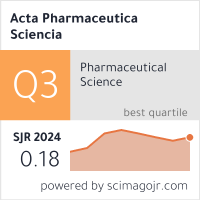ACTA Pharmaceutica Sciencia
2024 , Vol 62 , Num 2
The applicability of bioluminescent bacteria for preliminary screening of antibacterial activity: Comparative analysis of aqueous and ethanol extracts from plant raw material
1 Institute of Biochemical Technologies, Ecology and Pharmacy of Vernadsky CFU, Medicinal and Pharmaceutical Chemistry, Russian FederationDOI : 10.23893/1307-2080.APS6223 Viewed : 5183 - Downloaded : 1542 This study aimed to assess the effectiveness of whole-cell luminous biosensors in detecting the antibacterial activity of plant extracts. The biosensors included bioluminescent genetically modified Escherichia coli MG1655 pXen7 and naturally occurring Aliivibrio fischeri F1 bacterial strains. Initially, chemical substances known for their antibacterial properties, such as ethanol, quercetin, and zinc sulfate, were used to evaluate the functionality of the biosensors. Subsequently, 17 herbal extracts were screened for antibacterial activity in both aqueous and ethanol forms. As a result, extracts from Coreopsis grandiflora, Thymus vulgaris, and Monarda x hybrida demonstrated significant antibacterial potential, resulting in a 50% reduction in bioluminescence. Notably, A. fischeri F1 exhibited higher sensitivity compared to recombinant E. coli MG1655 pXen7 in detecting antimicrobial compounds at lower concentrations. The variations in the effects of extracts from different species within the same and different plant families were observed, utilizing both biosensors. These findings align with existing literature data regarding the antibacterial activity of the investigated plant species against pathogenic bacteria. Overall, the results underscore the efficacy of bioluminescent bacteria for the rapid screening of antibacterial properties in crude plant extracts. Keywords : antibacterial activity, lux-biosensors, Aliivibrio fischeri F1, Escherichia coli MG1655, crude plant extracts





